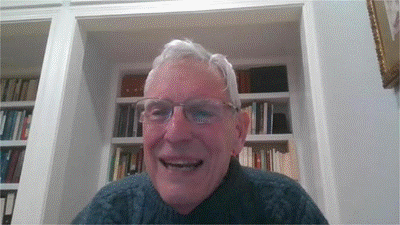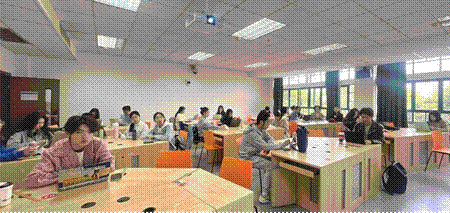On April 10, 2024, the Sixth session of “Leading Lecture Series on Frontier Studies” of Zijingang Global Forum on Interdisciplinary Studies 2024, organized by the Institute for Interdisciplinary Studies of World Literature of Zhejiang University, was held on Zijingang Campus, Zhejiang University. Marshall Brown, former editor of Modern Language Quarterly (A&HCI) and Professor Emeritus of the University of Washington, delivered an enthralling lecture entitled “Negative Sensibility and Keats’ Three ‘Odes’”. The lecture was moderated by Professor YANG Gexin of the Institute for Interdisciplinary Studies of World Literature and was attended by undergraduate, postgraduate, and doctoral students from the School of International Studies of Zhejiang University.

In the lecture, Professor Brown began with a discussion of a miniature portrait of John Keats painted by John Severn in 1819. At that time, Keats was a young poet with a melancholy face and wide-open eyes that look into the distance, seemingly into eternity. Keats, who died young but was immensely talented, wrote “Endymion”,a 4000-line epic poem, as well as “Lamia”, a 708-line romantic poem and such odes as “Ode to a Nightingale”, “Ode on a Grecian Urn”, and “Ode to Psyche”. Characterized by its richness of style, Keats’ poetry touches on themes of love, nature, and mythology. In his poetry, one can feel the fluctuations of emotions and see the real beauty and hope. Keats once spoke of an understanding of the nature of truth. In his opinion, nothing can be truth except what is held by the holiness of the soul and imagination. The idea is also the core of his romantic poetic theory, e.g., sensibility is noble while pure rational thinking alone cannot reach higher realms of truth. The achiever has a certain Negative Sensibility in literature that manifests itself when he is exposed to mysteries, doubts and uncertainties. Professor Brown claimed that poetry requires neither artificiality nor deliberate crafting of words and sentences, but flows freely with emotions if it is expected to touch the heart, in Keat’s view.
Professor Brown further discussed the form and typical elements of odes. As a type of poem in honor of gods or ancient Greek Olympians, the ode serves as a major means for poets to express their lofty ideals and feelings, characterized by long stanzas and complex rhyme schemes, with typical elements including addressing gods in descriptive language, involving ancient history and miraculous phenomena, and sharing the elements of mystery and questioning, etc.

Next, Professor Brown analyzed Keats’ masterpiece “To Autumn”, in which Keats celebrated autumn, depicting its abundance and portraying its fleeting beauty through vivid sensory imagery. Keats described death gently and beautifully as “a peaceful rest after madness” in an attempt to soften its harshness. In “Ode to a Nightingale”, Keats expressed his profound reflections on time, death, beauty, nature, and human beings, lamenting the immortality of the nightingale’s song. In fact, Keats explored two different types of beauty: the artistic world created by humans and the life world created by nature. Does nature, represented by the nightingale and its song, embody a beauty that is more eternal and grander than artificial things?

During the Q&A session, Professor YANG Gexin made further discussion with Professor Brown on the images of life and death in Keats’ poems. Professor Yang believed that the recurring imagery of life and death in Keats’ poetry actually stems from primal human memories of beauty and truth. With his unique sensitivity and imagination as a poet, Keats intuitively captures the dynamic relationship between life and death, truth and beauty, leading readers to experience the grandeur before death and fervently eulogizing the unity of maturity, death, and beauty.
The lecture is supported by the major project of the National Social Science Fund “Collation, Translation and Research of Contemporary Western Ethical Criticism Literature” [Project No. 19ZDA292].
“Zijingang Global Forum on Interdisciplinary Studies”, named after Zijingang Campus, the main campus of Zhejiang University, aims to provide an interdisciplinary platform for scholars engaged in humanities at home and abroad, especially those who are devoted to literary studies, to facilitate theoretical advancement, methodological innovation, intellectual promotion, and information exchange. As a foundational part of the Institute for Interdisciplinary Studies of World Literature, “Zijingang Global Forum on Interdisciplinary Studies” launches a series of academic activities and keeps its participants informed about current scholarship in the field. To be more specific, it consists of four major forums: “Leading Lecture Series on Frontier Studies”, “Leading Publication of Academic Achievements”, “Leading Forum on Interdisciplinary Studies for Young Scholars”, and “Leading Forum for University Students”.
Photos: ZHANG Caiyi
Text: ZHANG Caiyi
Institute for Interdisciplinary Studies of World Literature, Zhejiang University
April 10, 2024
Translated by LIU Mingyuan, Proofread by XU Xueying



